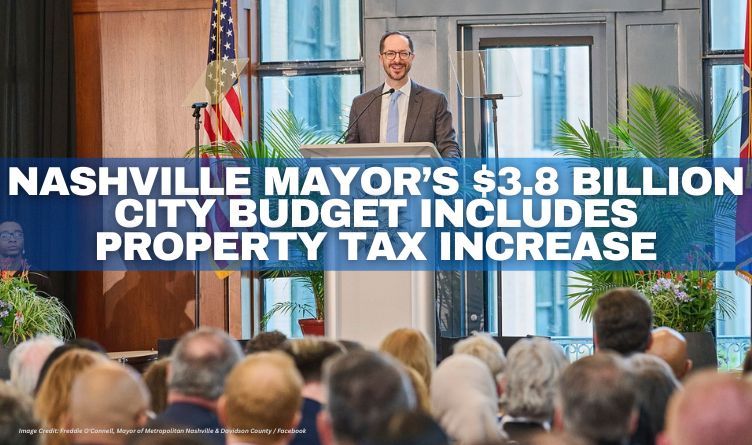O’Connell lists disappearing federal funds, maintaining service as reasons for new revenues.
Image Credit: Freddie O’Connell, Mayor of Metropolitan Nashville & Davidson County / Facebook
***Note: Article posted here for informational purposes only.
This story was originally published by the Nashville Banner. Sign up for their newsletter.
By Stephen Elliott, Nashville Banner [Creative Commons ] –
Mayor Freddie O’Connell painted an optimistic picture of the city at his annual State of Metro address Thursday at the downtown branch of the Nashville Public Library.
He cited reduced crime, improved educational outcomes and the success of his dedicated transit funding initiative, which is currently being implemented. O’Connell also acknowledged that many Nashvillians’ property taxes will increase this year under his proposed budget, set for two months of consideration and alterations by the Metro Council.

In an appraisal year, as this one is, calculating the impact of a new property tax rate can be confusing. State law requires tax rates to go down as property values go up, so O’Connell’s proposed tax rate is lower than last year’s, and in fact lower than it’s been in decades.
However, skyrocketing property values — the median increase was 45 percent — and the administration’s decision to raise the rate above the required lower rate means that many taxpayers will be paying more. His $3.8 billion annual spending proposal includes a proposed tax rate of 2.814 (dollars per $100 of assessed value), down from the 3.254 it has been since 2021, but representing a gross increase for many taxpayers.
“If you look at the rate of increase we’re proposing, it is almost exactly the cost of inflation over the previous five years,” the mayor told reporters after the speech. “We are trying to make sure we can afford Nashville’s growth, and this is a very back-to-basics budget.
“You heard the three fundamentals we’re looking at: They are schools, services and safety, and those are the fundamentals,” he continued. “And if we didn’t do this, we would lose something in every single one of those categories.”
That explanation did not stop a group of conservative anti-tax protesters from setting up outside the library with signs opposing the move.
Kathy Parris, an East Nashvillian since 1988, said it was her first time attending a protest.
“I believe fully that our budget needs to be cut, not property taxes increased,” she said. “I think that we will learn to live within our means. That’s what I do. Living within your means means cutting out things that are fluff, and there’s a lot of fluff.”
She couldn’t cite a specific area of city services she would like to see reduced, instead pointing to the example of the work of billionaire Elon Musk’s DOGE cost-cutting at the federal level.

O’Connell and city officials have been highlighting that Musk-inspired federal funding uncertainty for months as they previewed the budget.
Area governments, nonprofits, and educational institutions are on track to lose hundreds of millions of dollars in federal support, and Metro is suing the federal government to seek a reversal of some of the cuts.
“We’re not standing idly by as the federal government tries to cut funding that’s legally ours,” O’Connell said in the biggest applause line of the morning. “We’ve told them we’ll see you in court.”
The mayor also directly responded to the protesters in his speech.
“What they won’t tell you is that what they’re proposing means we wouldn’t fund our schools, services, and safety,” he said. “We wouldn’t open a new police precinct in Southeast Nashville, wouldn’t have the new police flex unit shrink the amount of time you have to wait when there’s an emergency, wouldn’t expand safety in schools.”
In his remarks, the mayor touted a 13 percent year-over-year increase in public school funding, a renewed focus on housing initiatives to support the newly released Unified Housing Strategy and support for police programs, including a transit unit and the new Southeast precinct.
The spending plan now heads to the Metro Council, which has until the end of June to either approve the budget or offer one of its own. Typically, the council has limited wiggle room as it edits the mayor’s proposal, as Metro Council Budget Chair Delishia Porterfield told the Banner after the speech.
“Historically, council has changed about less than 1 percent of the mayor’s budget,” she said. “The mayor gives us a really good baseline, but we always try to make sure to put our own spin on it and get community feedback to make sure that that budget is as values-aligned with the community as possible.”
The council will now hold a series of hearings to consider public feedback and debate potential changes.



